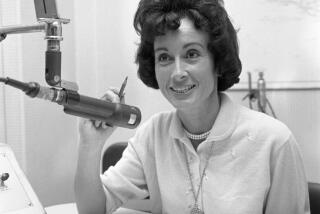AMERICAN CASSANDRA The Life of Dorothy Thompson <i> by Peter Kurth (Little, Brown: $24.95; 587 pp.) </i>
- Share via
It doesn’t seem quite proper, somehow, to commence a short review by quoting in toto a very long sentence, but Peter Kurth’s opening description of perhaps the most influential woman journalist of the century is too good to pass up. “The Reverend Peter Thompson’s elder daughter, according to family legend, ran away from home for the first time at the age of three, taking with her some docile, dimly remembered childhood playmate and her father’s buggy umbrella and heading straight down the line of the Erie Railroad into the open world.” But there you have Dorothy Thompson in a nutshell: precocious, independent, commanding, fearless, legendary.
Thompson isn’t particularly well remembered today, having done her best work before and during World War II, but Kurth’s book undoubtedly will inspire a positive reassessment of her career. Time magazine called Thompson a “national newshen” when she gave up her celebrated column “On the Record” in 1958, but that slighting description obscures the fact that for many years she was so renowned that her second husband, Sinclair Lewis, often referred to himself as “Mr. Dorothy Thompson.”
Few journalists, male or female, rivaled Thompson’s power in her prime, and fewer still led such colorful, complicated lives. Starting out as a publicist for the women’s suffrage movement, Thompson found her true calling at age 27, when she left for Europe in 1920, determined to become a journalist. She made her mark almost instantly as a free-lance foreign correspondent; within four years she headed a Berlin news bureau and was considered, in John Gunther’s words, “the best journalist this generation has produced in any country.”
Three years later she met and married Lewis, already famous as both drunk and novelist, and came very close to overshadowing him. Her political, journalistic and social circles were broader and deeper than his, for when Thompson wasn’t reporting she was entertaining--much to the annoyance of Lewis, who constantly ridiculed Thompson for her obsession with the world’s “situations and conditions.”
Thompson’s eclipse is due in some measure to her conclusion, following an interview with Hitler in the mid-1930s, that he would never come to power. Kurth argues that this faulty analysis was an exception to Thompson’s usual perspicaciousness, and he is persuasive.
Kurth does at times seem too partisan, especially regarding Thompson’s personal relationships. Lewis comes off very poorly here, as do some other members of Thompson’s family, but the author’s inclination to read things her way does make the book a good read. Kurth appears to understand Thompson considerably better than she did herself--which in fact isn’t a difficult impression to convey, given that Thompson seems to have avoided introspection whenever possible. All in all, “American Cassandra” is exemplary biography, thoroughly researched and entertainingly written.
More to Read
Sign up for our Book Club newsletter
Get the latest news, events and more from the Los Angeles Times Book Club, and help us get L.A. reading and talking.
You may occasionally receive promotional content from the Los Angeles Times.








